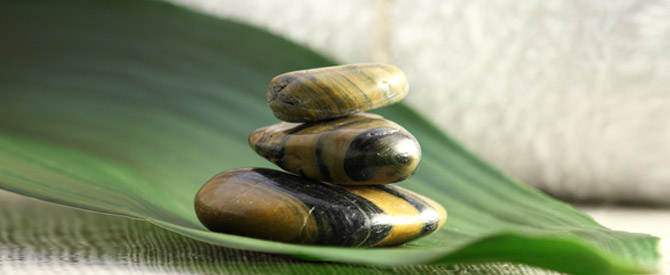We keep busy all day long doing something or the other. As long as we are alive, we can’t stop acting. After all, actions are the insignia of life, says spiritual master, Swami Chinmayananda.
A common complaint among spiritual seekers is that their everyday duties and activities leave very little time to pursue spirituality. The good news is that there is a way to grow through the very duties and actions that we do.
It involves a tweak in our attitude and adopting three practices that will guarantee our inner growth. But before knowing what these are, it’s important to understand the cycle of action.
The cycle of action
According to Vedanta, the spiritual science of life, not knowing the right attitude and right actions keeps us perpetually bound to the cycle of action. What is this cycle of action?
Actions leave two types of results—tangible and intangible. Tangible results are those that are experienced by the body and mind. Intangible results are subconscious impressions that are left in the psyche after the action is done.
Let’s take a simple action such as drinking a cup of coffee for the very first time.
When you drink the coffee, you enjoy the aroma, taste and the feeling of warmth in your body. Your mind relishes these feelings and comes to a conclusion, “Hmm…coffee is good!” These are the tangible results.
As the mind reacts to the experience, an impression is left as a memory. This is the intangible result of actions.
Every time you drink coffee in the future, the impression that coffee is good becomes stronger. Now, this impression doesn’t simply remain passively in your subconscious. It creates a tendency to want to repeat the experience of drinking coffee.
You can think of this impression as a seed that you have planted in your subconscious. It will sprout out as a desire that will prompt you to take the actions necessary to get a cup of coffee again. Every time you drink coffee, you strengthen the impression which propels you to repeat the action again. This is how habits are formed.
Here’s what this cycle looks like: Action => Result => Impression => Desire => Action => Result => Impression => Desire => Action . . . ad infinitum.
Just think of the innumerable number of impressions that we have in our mind from all the actions that we do every day.
Vedanta explains that when we act with ego and selfish desire we are bound to the cycle of action. To prevent laying down those binding impressions, we can tweak our attitude and the type of actions that we perform.
The best attitude
The best attitude while performing actions is to remain focused on the task at hand without worrying or insisting on any particular results. We do our actions and duties cheerfully while putting in our best efforts. We don’t allow our ego or personal likes and dislikes to influence what we do and how we do it.
To find out more the right attitude, read How to use your work to grow spiritually.
Taking this attitude, we can apply it to three practices that will guarantee our inner growth.
First practice: Dedicate your actions to a divine altar
The first practice is dedicating our actions to God or a divine altar.
You could think of it as letting go of your attachment to the results of your actions by offering them to the divine—the source from which you have received your faculties, abilities and blessings.
We can dedicate literally all our actions to the divine. All that we see, hear, taste, touch, smell, or actions that we do with our bodies such as walking, cooking, bathing and so on can all be offered up to the divine. Even the action and enjoyment of drinking a cup of coffee can be dedicated to the divine!
When we understand that all things and beings, all our activities and abilities come from one source, dedication becomes an act of gratitude. We relinquish our ownership of our activities and their results and offer them back to where they came. Dedication can be as simple as mentally saying, “For you. Thank you”.
My guru, Swami Chinmayananda tells us, What we have is His gift to us. What we do with it is our gift back to Him.
When our actions are motivated by gratitude and love for the divine, we don’t need any other incentives to act and work.
Second practice: Sharing your wealth with the needy
Once a feeling of gratitude comes into our heart, it’s only natural that we want to share our blessings with others. Sharing our wealth with the needy is the second practice.
Wealth here does not only mean the giving of money but includes sharing our skills and talents freely with others.
It’s key to remember to give without expecting any rewards such as monetary rewards, special favors or privileges. There should not even be the expectation of any words of praise or appreciation.
The giving must be without a sense of ego thinking, “I did it” or “I gave…” but come naturally from a feeling of genuine humility and noble intention.
When we give out of sincere gratitude, there’s neither a sense of attachment to the gifts nor the giving.
When we share our gifts with those who need it, it dilutes our ego and selfishness and cultivates love and compassion for others. This is surely a practice that helps us grow.
Third practice: Austerity
The third practice is one that is very much a personal inner discipline. It is the practice of austerity or self-control.
Practicing austerity is voluntarily imposing self-control for the purpose of gaining inner strength and integrity.
For example, you may make a strong resolve to always speak the truth and say it in a kind manner. You may also decide to not gossip or maintain a day of silence once a week. Austerity in speech can be very difficult.
Other examples of the practice of austerity include fasting on certain days of the week, waking up early and committing to a daily spiritual practice, giving up meat, fish and dairy from your diet and going vegan.
Imposing self-control helps to rein in the mind and saves energy that can then be channeled into spiritual pursuits such as contemplation and meditation.
It’s key to remember that the practice of austerity should be divinely guided and not done to achieve worldly goals.
Properly guided and practiced austerity weakens lower tendencies, eliminates negative habits, integrates the personality and brings us closer to our Higher Self.
Inner and outer peace and harmony
The first practice of dedicating our actions to a divine altar builds a stronger connection and faith in a higher power. The second practice of sharing of our wealth with the needy promotes harmony in society, and the practice of austerity brings peace and harmony within.
All three practices can be done throughout our lives, no matter what age we are. They will gradually reduce our ego and selfish desires that keep us stuck in the cycle of action. They will not only guarantee our inner growth but will also guarantee a happier world.
Like this post? Sign up for the free fortnightly Spiritual Solutions Newsletter and receive the latest articles, news and updates in your email inbox!














Manisha:
Thank you so much for your articles and information.
Best Regards,
Norma Malinowicz
Thanks Norma! And I’m happy and grateful for your interest and support!